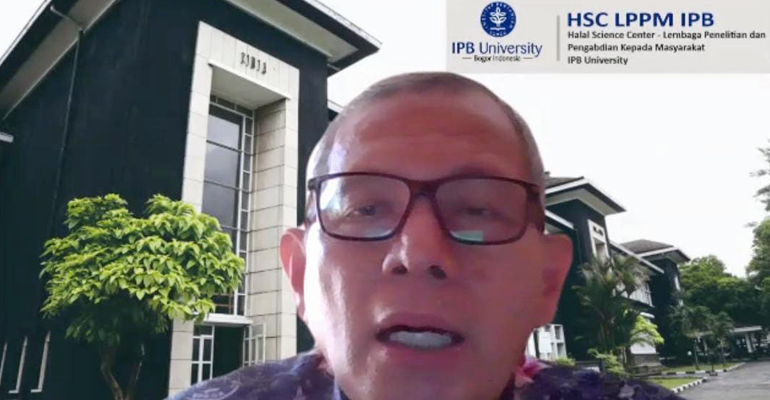Halal Science Center IPB Holds Socialization for Restaurant and Catering Business Actors

Halal Science Center (HSC) IPB University held a Halal Socialization Webinar for Restaurant and Catering Business Actors online, Thursday (31/8). This webinar was attended by restaurant and catering practitioners from various regions.
Prof Khaswar Syamsu, Head of HSC IPB University said that this socialization needs to be held because there are still only few business actors who know how to apply for halal certification. The halal certification process is also different from halal production.
“All menus sold must be halal including consignment products. Restaurants and caterers also need to have standard procedures in their processing,” he said.
In this activity, two speakers were present, namely Betty Marita MSi, lecturer and researcher of HSC IPB University and Lady Yulia MSi, Halal Sub-Coordinator, Halal Examining Agency (LPH), Halal Product Guarantee Agency (BPJPH).
IPB University lecturer, Betty Marita MSi reviewed the preparation of the halal certification process. She said, the main step that business actors need to do is to complete the selection of ingredients and make a list of ingredients that already have the appropriate supporting documents. After that, a list of ingredients is compiled including halal information, country of origin for imported goods, and suppliers.
“In the second stage, namely purchasing, the ingredients purchased are also those that are already on the halal ingredient list, then, an inspection of the arrival of the ingredients is carried out regarding the suitability of the information on the packaging label,” said Betty.
Third, she said, it is necessary to pay attention to the appropriate storage process to avoid haram materials. Fourth, it is necessary to pay attention to the production process which includes critical activities that are often the cause of unlawfulness. This includes paying attention to the list of halal ingredients and the process of washing equipment so as not to cause unclean contamination. Finally, in serving, if packaged, then the primary packaging or direct contact with the product must also be halal.
“In preparation for certification, in addition to documents, human resources must also be competent and committed to implementing a halal assurance system, only then can they apply for certification through the SiHalal system,” she continued.
Meanwhile, Lady Yulia MSi discussed halal certification regulations for restaurants and caterers in Indonesia. She said that only few restaurant and catering businesses are halal-certified even though it is required by law.
To encourage the acceleration of this certification, the government is targeting the staging of halal certification obligations in October 2024. “First, business actors must have a commitment so that the goods being traded do not become an issue and become a party to harm or harm the community,” Lady said.
She explained that this halal certification will bring benefits, especially as an identity for MSMEs to be more accepted and trusted by the public. Aside from document preparation, business actors must ensure the traceability of the materials used must be in accordance with halal. (MW/ra) (IAAS/MKY)



